Home | Category: Rabbis, Synagogues and Prayers
RABBI YITZHAK KADURI
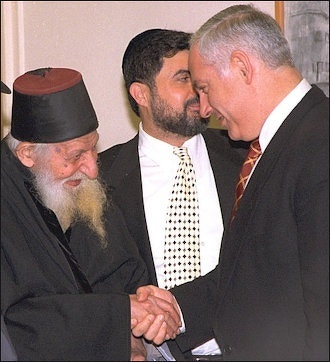
Rabbi Kaduri with Netanyahu
Rabbi Yitzhak Kaduri was a controversial Jewish mystic who began his career sending curses and finished it off deciding elections for right-wing Israeli politicians. Lawrence Joffe wrote in The Guardian, “Few people wait almost a century before joining the political fray, yet the Israeli rabbi and mystic Yitzhak Kaduri, who died at an estimated age of 106, did precisely that. In May 1996 he probably swung the crucial balance of 29,000 voters who ensured that the Likud leader Benjamin Netanyahu was elected prime minister of Israel. He did so by distributing thousands of "magic" amulets to his devotees, who were then obliged to vote for Netanyahu in the prime ministerial poll and for the Orthodox Shas party in the simultaneous party elections. Kaduri also bolstered Netanyahu's platform of "restoring Jewish values" by publicly endorsing him before polling day. [Source: Lawrence Joffe, The Guardian, January 31, 2006 ~~]
“Small, bent and wizened, invariably draped in the white robes of an oriental Jewish kabbalist (or purveyor of Jewish mysticism), Kaduri was little known in political circles until May 1996. But images of his benignly smiling face, which dangled from the rear-view mirrors of taxis scuttling between Tel Aviv and Jerusalem, indicated his popularity. ~~
Rabbi Kaduri was born around 1900 in Iraq and went to Jerusalem early in the 20th century. He lived in a poor neighbourhood, attended Porat Yosef yeshiva (or rabbinical seminary) and, around 1930, transferred to Beit El (House of God) yeshiva, a centre for studying the mystical tradition in Judaism. ~~
Kaduri had many enemies and critics. The liberal daily, Ha'aretz, sardonically named him Man of the Year in 1998. Former Sephardi chief rabbi Ovadiah Yosef questioned his credentials, highlighting the fact that Kaduri had never written a single religious article, let alone a book. Kaduri, in turn, criticised show-business and other celebrities who claimed to have taken up Judaism's mystical tradition. When Madonna made a midnight visit to the grave of a sage while visiting Israel in 2004, he asserted: "It is forbidden to teach Kabbalah to a non-Jew."
Rabbi Kaduri died in January 2006, An estimated 200,000 people filled the streets of Jerusalem for his funeral. In 2000, Kaduri spoke of a vision in which heaven blessed a little known Israeli presidential candidate, Moshe Katsav. As a result all 17 Shas MPs voted for Katsav, defeating the favourite, Shimon Peres.
Lawrence Joffe wrote in The Guardian, Once Rabbi Kaduri “acquired a taste for politics, it seemed he could not stop. He was soon urging more building at Har Homa, a controversial development south of Jerusalem and something of a rightwing cause célèbre. He also initiated bold personal bids for peace with Israel's arch-enemies, Syria and Iran. At one point he suggested trading the Golan Heights for an accord with Damascus - to the chagrin of Likud and Labour alike - though he subsequently changed his mind and ruled out returning the territory. [Source: Lawrence Joffe, The Guardian, January 31, 2006 ~~]
RECOMMENDED BOOKS:
“Einstein and the Rabbi: Searching for the Soul” by Rabbi Naomi Levy Amazon.com ;
“Rebbe: The Life and Teachings of Menachem M. Schneerson, the Most Influential Rabbi in Modern History” by Joseph Telushkin, Rich Topol, et al. Amazon.com ;
“Pearls of Wisdom from Rabbi Yehonatan Eybeshitz: Torah Giant, Preacher & Kabbalist by Rabbi Yehonatan Eybeshitz and Rabbi Yacov Barber Amazon.com ;
“Essential Judaism: Updated Edition: A Complete Guide to Beliefs, Customs & Rituals”
by George Robinson Amazon.com ;
“Guide for the Perplexed” by Moses Maimonides, Andrea Giordani, et al. Amazon.com ;
“Living Judaism: The Complete Guide to Jewish Belief, Tradition, and Practice”
by Wayne D. Dosick Amazon.com ;
“Judaism: History, Belief and Practice” by Dan Cohn-Sherbok Amazon.com ;
“The Transformation of Israelite Religion to Rabbinic Judaism” by Juan Marcos Bejarano Gutierrez Amazon.com ;
“Understanding Second Temple and Rabbinic Judaism” by Lawrence H. Schiffman , Jon Bloomberg, et al. Amazon.com ;
“Living a Jewish Life: Jewish Traditions, Customs, and Values for Today's Families” by Anita Diamant, Howard Cooper, et al. Amazon.com ;
“To Be a Jew Today: A New Guide to God, Israel, and the Jewish People”
by Noah Feldman Amazon.com ;
“A History of the Jews” by Paul Johnson, Amazon.com
Rabbi Kaduri’s Political Career
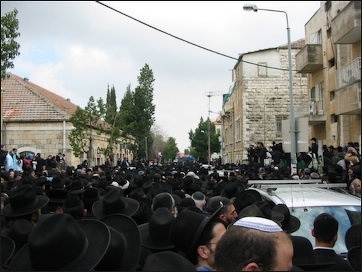
Rabbi Kaduri's funeral
“Particularly embarrassing for Israel's secular right was the incident in October 1997 when Netanyahu whispered to Kaduri that leftwing Israelis had "forgotten what it means to be Jewish" and were willing to "place our security in Arab hands" - not realising that the television cameras were still rolling at the time. In fairness, Kaduri never asked to be Netanyahu's confidant. Many, in fact, saw the sage as a senile victim of mischievous cohorts - especially his grandson Yossi Kaduri. ~~
“So what transformed the humble saint into a political potentate? The answer partly lies in Israel's recent social changes. Sephardi Jews who came to Israel from the Middle East and north Africa felt ostracised by the secular, socialist establishment. Many expressed their defiance by backing the opposition Likud. Others took solace in traditional modes of worship, such as Kaduri's. ~~
“In March 1997, Kaduri intoned over Netanyahu i: "May the Almighty keep and protect the prime minister; may he live long, defeat all his enemies and win the next elections." Clearly in a generous mood, he got a party of Israeli Arabs to convey goodwill messages to the then Syrian president, Hafez al-Asad. In September 1997 he blessed Asad - albeit by letter - invited him to visit Jerusalem and called for "a historic reconciliation between our two peoples". Three months later, a similar Kaduri missive was dispatched to Iran's Grand Ayatollah Ali Khamenei. Apparently peeved by the treatment of his once-imprisoned protege and former Shas leader, Aryeh Deri, Kaduri's family conjured up a new party, Ahavat Yisrael (Love of Israel), but it returned no seats in the 2003 elections.”
Rabbi Ovadia Yosef: Leader of Sephardic Jews and Ultra-Orthodox Shas Party
Rabbi Ovadia Yosef was the chief rabbi of Israel's Sephardic Jewish community and spiritual head of the ultra-orthodox Shas party.Lawrence Joffe wrote in The Guardian: “Resplendent in his gold brocaded black gowns and purple turbans, Rabbi Ovadia Yosef,” who died at the age of 93 in 2013, “often resembled a medieval stranger marooned in the modern world. In fact, he was one of Israel's most astute public operators. As spiritual head of the ultra-orthodox Shas party, Yosef influenced the course of Israeli politics. And as former chief rabbi to Israel's Sephardim and Mizrachim – Jews of Iberian, North African and Middle Eastern origin – he rekindled a sense of communal pride not experienced for centuries. [Source: Lawrence Joffe, The Guardian, October 7, 2013 |+|]
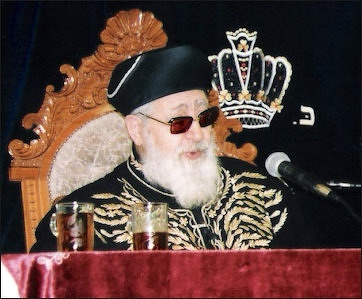
Rabbi Ovadia Yosef
“Yosef applied ancient laws to contemporary circumstances. Often he would study until 3am in his booklined three-room flat. Every Sabbath hundreds flocked to a modest Bukharan synagogue in Jerusalem – the Bukharan Jewish community came from central Asia – to hear sermons which were beamed around the world by internet. A spokesman for the downtrodden and a champion of faith, or a bigoted autocrat who undermined democracy, and whose political dalliances sullied his religious purity? At least Yosef silenced orthodox Ashkenazim who once had lampooned him and his community. |+|
“Yet Yosef was also an enigmatic man whose austere public face hid his private charm. He adopted progressive stances which few Israeli rabbis favoured – such as accepting the Jewish status of Ethiopian Beta Israel, or "Falashas", in the 1970s, championing peace with the Palestinians in the 1980s and sanctioning organ donations in the 1990s. |+|
“On the other hand, he often took abstruse, even offensive positions. He lambasted Reform Jews as "destroyers of religion"; claimed that Jewish law forbade men to walk between women; and told President Bill Clinton to "kiss our feet". In 1999 he repudiated the supreme court after his protege, Aryeh Deri, was jailed for accepting bribes. In 2000 he called Holocaust victims "reincarnated souls of sinners"; later he likened Palestinian and Arab foes to snakes and vipers. In 2010 he said gentiles should serve Jews, he once called Binyamin Netanyahu a "blind she-goat" and this year he dubbed a religious Zionist party as a "home for goyim [non-Jews]".” |+|
Rabbi Ovadia Yosef, 93, wielded enormous influence among Israeli Jews of Middle Eastern and North African ancestry but courted controversy with his outspoken views. In 2001, Yosef had called for "Arabs' annihilation”: "It is forbidden to be merciful to them. You must send missiles to them and annihilate them. They are evil and damnable." In 2010, while Israeli Prime Minister Benjamin Netanyahu was calling for peace talks to bring enduring peace to the Middle East, Rabbi Yosef denounced the move, saying the Palestinians and their leader were "an evil and bitter enemies of Israel" who should "perish from this world." The rabbi was quoted as saying during his weekly sermon at a synagogue near his Jerusalem home: "Abu Mazen (nom de guerre for Abbas) and all these evil people should perish from this world...God should strike them with a plague.” [Source: PTI, August 29, 2010]
Rabbi Ovadia Yosef’s Life and Family

Rabii Ovadia as a child with his father and siblings
Yosef was born Abdullah Youssef in Baghdad, Iraq. Lawrence Joffe wrote in The Guardian: “At four he arrived in British Mandatory Palestine with his parents, Yaakov and Georgia. In Jerusalem he enrolled at Porat Yosef Yeshiva, the leading rabbinical Sephardi seminary. While poverty forced him to study by moonlight, at 18 he wrote the first of his more than 30 books. Ordained a rabbi at 20 and made a religious court judge at 25, in 1944 he married Margalit Fattal, who came from Aleppo, in Syria. [Source: Lawrence Joffe, The Guardian, October 7, 2013 |+|]
“Three years later Yosef was appointed chief rabbi of Cairo, just as tensions in Palestine undermined the security of Egypt's Jewish community. He nonetheless defended Jews' right to statehood. His affection for Egypt was reciprocated 50 years later when Hosni Mubarak afforded him a near-royal reception as Israel's emissary for peace. |+|
“Yosef returned to an independent Israel in 1950. In 1968 he became chief rabbi of Tel Aviv, a hedonistic city which the more pious considered little better than Sodom and Gomorrah. Yosef was known for generally lenient rulings when he was Israel's chief Sephardi rabbi, from 1973 to 1983. In 1974, for instance, he allowed around 1,000 women whose husbands remained missing in action after the 1973 Yom Kippur war to remarry.” |+|
Ovadia Yosef was born on September 23, 1920 and died on October 6, 2013, His wife Margalit died in 1994; Yosef is survived by 10 of his 11 children. Each of his 11 children either became a rabbi or married one. His eldest daughter, Adina Bar-Shalom, established the Haredi College of Jerusalem. Above all, Yosef reminded Israel's Sephardi Jews (to quote a Shas slogan) that they came from "generations of sages, not criminals". |+|
Rabbi Ovadia Yosef’s Political Life
Lawrence Joffe wrote in The Guardian: “It was as spiritual mentor of Shas – an acronym for "Sephardi Torah Guardians" – that he truly made his mark. The party began as a municipal list in Jerusalem in 1983. Then Yosef dictated its policies and handpicked its prospective Knesset members, including the 25-year-old Deri, a rabbi and friend of his son, David. Soon Shas blossomed into a national political force that fused religious zeal with an ability to articulate Sephardi grievances. For despite constituting half the population, Sephardim still felt that both Israel's secular establishment and Ashkenazi-run orthodox parties treated them like second-class citizens. [Source: Lawrence Joffe, The Guardian, October 7, 2013 |+|]
“Yosef wooed the less observant. He preached in cinemas, stressed a compassionate social agenda and created a network of 1,800 Shas-run schools and welfare centres in poor neighbourhoods. Yet a generation of Sephardi religion students - including most Shas politicians - still owed primary loyalty to a nonagenarian Lithuanian-born Ashkenazi sage, Rabbi Eliezer Schach. |+|
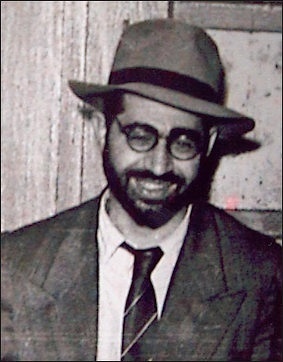
Rabbi Ovadia as a young man
“In August 1989 Yosef ruled that Israel should relinquish parts of the biblical "Land of Israel" (located in Palestinian territories), if that could prevent bloodshed and bring lasting peace. Religious settlers immediately attacked his ruling. Undaunted, Yosef and Deri visited Egypt in 1990 to discuss initiatives with Mubarak. In March that year, Yosef ordered Deri to leave the Likud-Labour coalition government, and join a pro-peace Labour alliance led by Shimon Peres.
But Schach countermanded Yosef, corralled Shas back into government, and gave a two-year lease of life to the ailing Likud. Yosef displaced Schach as party guru on the eve of the June 1992 elections. Shas's subsequent entry into Yitzhak Rabin's coalition government seemed like a "dream ticket", combining Shas piety with Labour pragmatism. |+|
“Reality, however, proved different. Shas clashed over education policy with another coalition partner, the secular Meretz party. Investigations into Shas corruption fuelled Sephardi suspicions about prejudice in Israel's establishment. In September 1993 Shas left the government on the day that Israel signed the historic accords with the PLO. In opposition, Yosef avoided the vilification of Rabin that indirectly led to the latter's assassination in November 1995. However, he failed to get Shas to endorse Rabin's successor, Peres, as presidential candidate. Instead most voted for Netanyahu, who went on to win the May 1996 elections. Despite that, Shas gained 10 seats and Yosef persuaded Netanyahu to grant it two key ministries, interior and labour. He offered to meet Yasser Arafat personally, when Netanyahu refused to do so. His dialogue with Palestinian police chief Nasser Yusuf arguably saved lives on both sides. In 1997 Yosef invoked the Talmud to condemn Israeli zealots who usurped Arab property in east Jerusalem. And he threatened to sabotage the government if Netanyahu did not redeploy troops from the occupied territories, as promised in the Oslo agreement. |+|
“However, in late 1997 Yosef's dithering nearly sank plans to withdraw Israeli troops from Hebron. In 1998 he opposed reform Jewish converts becoming Israelis. In 1999 he proposed packing the supreme court with rabbis and condemned Russian immigrants as "whores and crypto-Christians". Israel's media called it a descent into lunacy. Despite having suffered a heart attack, Yosef was helicoptered to mass rallies across Israel, his face adorned Shas posters and he even won votes from Israeli Arabs, grateful for Shas's ministerial largesse. In 1999 Shas increased its tally of Knesset seats to 17, two short of Likud itself. |+|
Rabbi Yosef: the Kingmaker
AFP reported: “Yosef had frequently played the role of kingmaker Yosef, a former Sephardic chief rabbi of Israel whose son took over the same role in June 2013, had frequently played the role of kingmaker in the country's fickle coalition politics. He was spiritual leader also of ultra-Orthodox party Shas, which was a member of most ruling coalitions before going into opposition after January 2012 elections. Yosef founded Shas in 1984 on the platform of a return to religion and as a counter to an establishment dominated by Ashkenazi Jews of European ancestry. [Source: AFP, October 8, 2013 ^*^]
“The Baghdad-born rabbi frequently courted controversy with his outspoken remarks, describing Palestinians and other Arabs as "snakes" and "vipers" who were "swarming like ants". He called on God to strike down then prime minister Ariel Sharon over Israel's 2005 withdrawal from Gaza, and during the 2006 war in Lebanon, he implied Israeli soldiers killed in battle died because they did not follow Jewish commandments. ^*^
“Despite his outbursts, Yosef had for many years advocated peace talks with the Palestinians based on his respect for the sanctity of life, said the Jerusalem Post's Jeremy Sharon. "Yosef was of the opinion that if a peace process could be conducted with Palestinians and save lives, then territorial compromises could be considered," he said. But following the failure of the 1993 Oslo Peace Accords, Yosef shifted politically to the right. ^*^
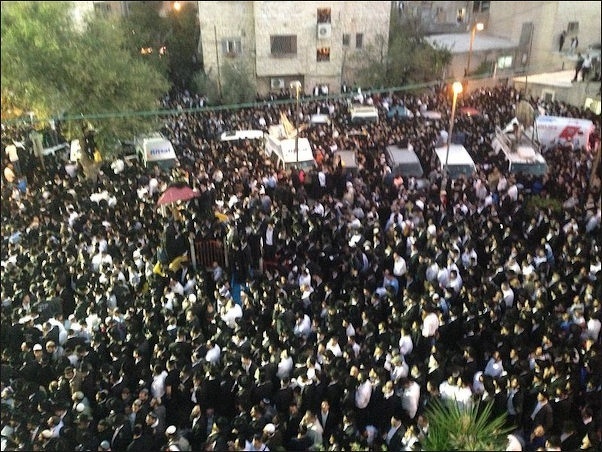
Rabbi Ovadia's funeral
Lawrence Joffe wrote in The Guardian: “Yosef increasingly veered to the right, as did Shas under the political stewardship of Eli Yishai, which left a Labour-led government in 2000. The rabbi opposed Ariel Sharon's disengagement from Gaza in 2005. That year Israel arrested three Palestinian militants for planning to assassinate Yosef. Nonetheless, he part-inspired the 2011 social protests in Israel. Despite months in hospital, he ensured that one son, Yitzhak, was appointed chief rabbi in June 2013, and apparently thwarted the outgoing chief rabbi, Shlomo Amar, from succeeding him in his guiding role with Shas. The party lost seats in this year's elections and for the first time other rabbis openly criticised the ailing Yosef.” |+|
Over 700,000 Attend Rabbi Yosef’s Funeral
In October 2013, more than 700,000 people took the streets of Jerusalem to mourn Rabbi Ovadia Yosef’s death . It was the spiritual leader of Israel's Sephardic Jews, It was an unprecedented procession and expression of grief. AFP reported: “The mourners, mostly ultra-Orthodox Jews and with men separated from women, gathered outside Yosef's seminary, before heading to his burial in Jerusalem's conservative Sanhedria district. "We estimate there are more [than] 700,000 people taking part in the largest of funerals ever in Israel," police spokesman Micky Rosenfeld wrote on Twitter. Officially, there are currently slightly over six million Jews in Israel, meaning more than one in every 10 was at the funeral. [Source: AFP, October 8, 2013]
“Police deployed in their thousands, blocking off some of the Holy City's roads. Emergency services said the overcrowding injured some 300 people. "We've lost a father," Eliel Hawzi, a 26-year-old in the middle of his military service, said. "Rabbi Yosef is irreplaceable for the Jewish people.” “I've been crying since I heard the news," said Aviel Mor, a 24-year-old yeshiva religious seminary student, who like hundreds of others tore the lapel of his shirt in the Jewish tradition of mourning for immediate family members.
“His death sparked an outpouring of emotion within the Sephardi community. "You abandoned us in the most difficult time for the religious world, and we don't know where to turn, who will guide us, who will show us the way?" Shas leader Arye Deri asked at the funeral. “News of his deteriorating health prompted Israeli president Shimon Peres to cut short a working meeting with his Czech counterpart Milos Zeman and rush to the rabbi's bedside, his office said. Mr Peres later delivered a eulogy for "my teacher, my rabbi, my friend". "I held his hand which was still warm and kissed his forehead. When I pressed his hand I felt I was touching history and when I kissed his head it was as though I kissed the very greatness of Israel," he said of his earlier meeting with the rabbi.”
Image Sources: Wikimedia, Commons except last picture, Times of Israel
Text Sources: New York Times, National Geographic, BBC, Washington Post, Los Angeles Times, Smithsonian magazine, Times of London, Library of Congress, The New Yorker, Reuters, AP, AFP, Lonely Planet Guides, and various books and other publications.
Last updated March 2024
